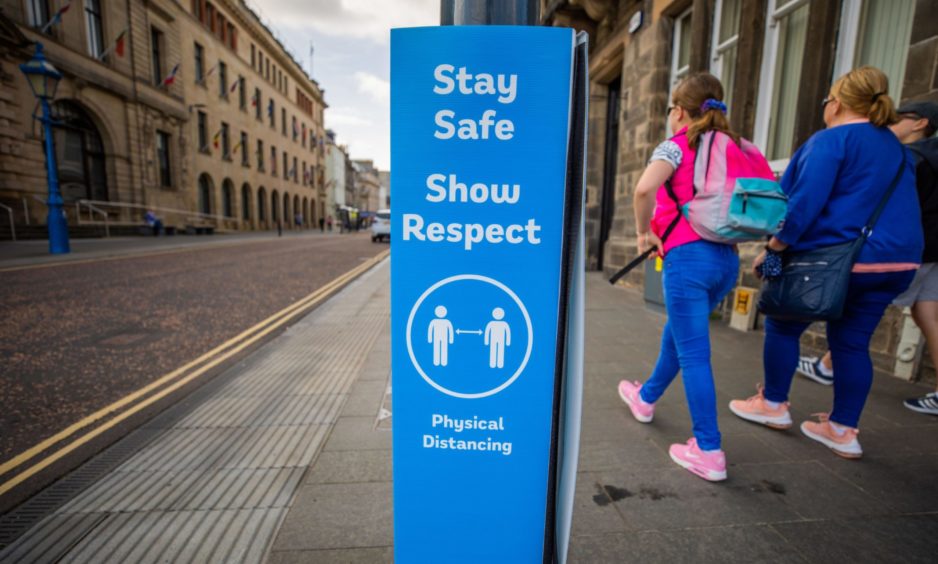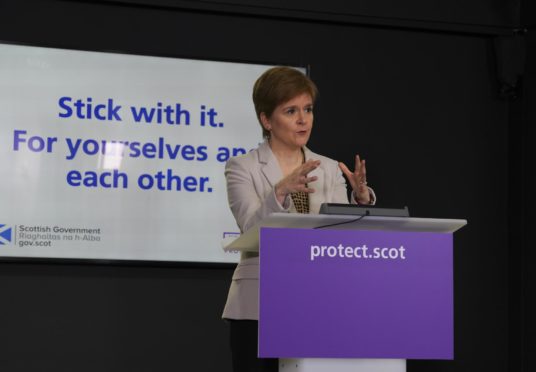Nicola Sturgeon has pledged to use any time bought by the introduction of tough new coronavirus restrictions this week to strengthen Scotland’s testing network and increase capacity.
The first minister, her cabinet and Scottish Government advisers have been pondering new measures to help drive down the spread of Covid-19 following a sharp rise in cases over the past few weeks and months.
The SNP leader will meet ministers on Wednesday morning before making a statement to the Scottish Parliament later in the day to outline her plans.
A Scottish Government document leaked last month appeared to show ministers were considering putting the country into a strict “rolling lockdown” for two or three weeks linked to the October break in a bid to break the cycle of transmission.
The effectiveness of the so-called “circuit breaker” has been the topic of fierce debate but Ms Sturgeon confirmed a return to full lockdown measures, similar to those seen earlier in the year, has been ruled out by her government.
Speaking during the daily coronavirus briefing on Tuesday, she said any new measures, whether temporary or long-term, would be about “trying to reduce the rate at which the virus is spread but also about trying to reduce the overall number of people in the infectious pool in the country”.
The first minister was asked how confident she was that the measures would have a meaningful long-term impact and whether she would look to use the time to improve any areas of pandemic handling.
She said: “If you’re putting measures in place, you’ve got to use any time that buys you productively.

“Test and Protect is working well but we know we want to continue to build that, to expand its capacity, strengthen its resilience, look at how our testing strategy develops over the period.
“And given a lot of this is about controlling the virus while still living as normally as we possibly can, it is also about making sure we take the time to improve compliance, get the right messages across, make sure the regulation that is in place for different sectors of the economy is still fit for purpose.
“So it’s not just about putting the measures on to pause things, important though that is, it’s about then using that time to do things that further strengthen, hopefully, our ability to live with the virus even more normally than we are at the moment.”
Restrictions: What has been ruled out?
Ms Sturgeon was unable to share specific details of her plans on Tuesday after her cabinet were unable to reach agreement on the way forward but she did share some of the ideas that definitely will not be included.
The first minister said there will be:
- No new lockdown “at this stage, even on a temporary basis”.
- No request for the public to remain in their homes in a similar fashion to March, when people were limited on how and where they could take daily exercise.
- No restrictions “on the whole of the country” for non-essential travel.
- No shutdown on the wider economy or halt on the remobilisation of the NHS.
- No school closures, even partially, outwith the normal October holidays.
What could new measures look like?
Ms Sturgeon did not rule out out local travel restrictions or the possible closure of pubs and restaurants in areas with higher rates of the virus.
During the initial lockdown in March, a five-mile limit was in place for non-essential journeys, something the first minister said was “part of the consideration” at one stage but had now been ruled out.
The first minister also gave an indication that pubs and restaurants could face tighter controls. She said the list of measures being ruled out “does bring into scope” further restrictions in the hospitality industry.

People are banned from visiting other households under current rules but can meet one other household, up to a maximum of six people, in pubs, restaurants and cafes.
Ms Sturgeon said if asking people not to visit other people’s houses was not enough to bring the virus under control, she would have to look at other settings where people are likely to come together or meet with large groups of other people.
It is seen as unlikely that new restrictions will be brought in for an unspecified period of time, and national clinical director Jason Leitch has talked about two weeks being enough to buy the country another 28 days in the fight against the virus.
What is happening elsewhere?
Huge swathes of Europe are now dealing with a second wave of coronavirus and many countries have started putting in place their own measures to tackle the problem.
France, a nation referenced repeatedly by the first minister as a warning to Scotland, has limited gatherings to a maximum of 10 people, and wedding receptions, students parties and other organised gatherings in hired locations are banned.
There are also now localised restrictions in place in Paris, with bars, gyms and swimming closing for two weeks from Tuesday.
Spain too has introduced a new lockdown in Madrid and nine surrounding areas, meaning almost five million people are now only allowed to leave their local area to go to work, school, or to receive medical care.
Meanwhile, all non-essential travel has been discouraged in Dublin following a recent surge in cases.
